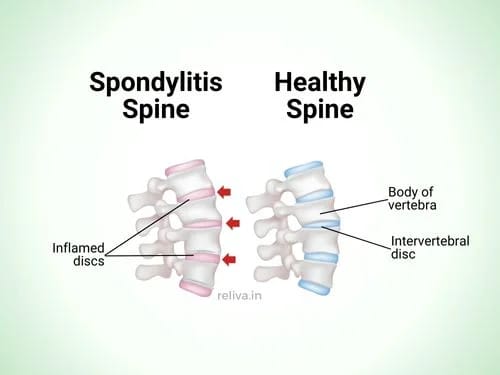Expert Spondylitis Treatment in Vadodara
Manage inflammatory spinal conditions, reduce chronic pain and maintain mobility with specialized chiropractic care. Comprehensive treatment for ankylosing spondylitis and related conditions.

Understanding Spondylitis
Spondylitis refers to a group of inflammatory arthritis conditions that primarily affect the spine
What is Spondylitis?
Spondylitis is an autoimmune inflammatory condition that causes chronic inflammation of the spinal joints, leading to pain, stiffness, and potential fusion of vertebrae. Unlike mechanical back pain, spondylitis involves the immune system mistakenly attacking the spine's joints and connective tissues.
Key Types of Spondylitis:
- Ankylosing Spondylitis (AS) - The most common form, primarily affecting the sacroiliac joints and spine
- Psoriatic Arthritis with Spinal Involvement - Associated with psoriasis skin condition
- Enteropathic Arthritis - Linked with inflammatory bowel diseases
- Reactive Arthritis - Following infections in other body parts
- Undifferentiated Spondyloarthritis - Early or atypical forms of the disease
Common Characteristics:
- Inflammatory back pain - Worse with rest, improves with movement
- Morning stiffness - Typically lasting more than 30 minutes
- Progressive nature - Can lead to spinal fusion over time
- Systemic involvement - May affect eyes, skin, and other joints
- Genetic predisposition - Strong association with HLA-B27 gene
Early diagnosis and proper management are crucial for preserving spinal mobility and preventing long-term complications.

Recognizing Spondylitis Symptoms
Symptoms typically develop gradually and follow distinct inflammatory patterns
Inflammatory Back Pain
Chronic pain and stiffness worse in mornings or after inactivity, improving with movement and exercise. Often begins in sacroiliac joints.
Progressive Stiffness
Gradual reduction in spinal flexibility, difficulty bending or twisting, and decreased range of motion that worsens over time.
Systemic Symptoms
Fatigue, low-grade fever, weight loss, and general malaise due to systemic inflammatory response and autoimmune activity.
Extra-articular Manifestations
Eye inflammation (uveitis), skin conditions (psoriasis), bowel inflammation, and enthesitis (inflammation where tendons attach to bone).
Understanding Spondylitis Progression
Early intervention is crucial for managing disease progression and preserving function
Early Stage (0-5 years)
Symptoms: Intermittent inflammatory back pain, morning stiffness, fatigue
Changes: Early sacroiliitis, mild inflammation visible on MRI
Goal: Early diagnosis, inflammation control, mobility preservation
Established Disease (5-15 years)
Symptoms: Chronic pain, significant stiffness, reduced spinal mobility
Changes: Visible structural changes on X-ray, possible early fusion
Goal: Symptom management, prevent deformity, maintain function
Advanced Disease (15+ years)
Symptoms: Spinal fusion, fixed posture, significant mobility limitations
Changes: "Bamboo spine" appearance, complete vertebral fusion
Goal: Pain management, adapt activities, prevent complications
Note: Progression varies significantly between individuals. Many patients maintain good function with proper management.
Our Spondylitis Treatment Approach
Comprehensive chiropractic care to manage inflammation and preserve spinal function
Comprehensive Assessment

Inflammatory Pattern Analysis
Detailed evaluation of pain patterns, morning stiffness duration, and response to activity to differentiate inflammatory from mechanical back pain.

Mobility Assessment
Comprehensive measurement of spinal range of motion, chest expansion, and functional mobility to establish baseline and track progress.

Postural Evaluation
Assessment of spinal alignment, potential kyphosis development, and compensatory patterns that may develop due to inflammatory changes.
Our Treatment Methods

Gentle Joint Mobilization
Low-force techniques to maintain spinal mobility, reduce stiffness, and prevent fusion while respecting inflammatory limitations.

Myofascial Release
Specialized soft tissue techniques to address muscle guarding, reduce tension, and improve circulation around inflamed spinal segments.

Therapeutic Exercise Program
Customized exercises focusing on maintaining spinal extension, improving posture, and preserving range of motion specific to spondylitis needs.

Respiratory Exercises
Specialized breathing techniques to maintain chest expansion and rib cage mobility, which can be compromised in advanced spondylitis.

Postural Re-education
Training in proper sitting, standing, and sleeping positions to counteract the forward-flexion tendency common in spondylitis.

Lifestyle & Flare Management
Comprehensive guidance on activity pacing, stress management, and flare-up strategies to maintain function during inflammatory episodes.
Patient Success Story
Real results from our spondylitis management program
"I was diagnosed with ankylosing spondylitis in my late 20s and struggled with severe morning stiffness and progressive back pain for years. Traditional approaches focused only on medication, but I wanted a more holistic approach. At Spine-X Clinic, Dr. Chandresh developed a comprehensive management plan that combined gentle chiropractic care with specific exercises and lifestyle modifications. The difference has been remarkable - my morning stiffness reduced from 2 hours to 20 minutes, and I've maintained full spinal mobility despite having AS for over a decade. The team understands the unique challenges of inflammatory conditions and provides care that complements medical treatment perfectly."
- 35-year-old patient from Vadodara (Ankylosing Spondylitis Management Success)
Daily Management Strategies for Spondylitis
Proactive approaches to maintain function and quality of life
Morning Routine
Start with gentle stretching and warm showers to reduce morning stiffness. Avoid sudden movements and allow time for your body to "wake up."
Regular Movement
Incorporate daily walks, swimming, or cycling to maintain mobility. Avoid prolonged sitting or standing in one position.
Anti-inflammatory Nutrition
Focus on Mediterranean diet principles: omega-3 rich foods, colorful vegetables, and limit processed foods and sugars that may increase inflammation.
Sleep Positioning
Sleep on a firm mattress, preferably on your back with a thin pillow to maintain spinal alignment. Avoid fetal position that encourages flexion.
Stress Management
Practice relaxation techniques like meditation, deep breathing, or yoga. Stress can trigger inflammatory flares in autoimmune conditions.
Consistent Care
Maintain regular chiropractic and medical follow-ups. Don't stop management during remission periods - consistency is key for long-term success.
Ready to Take Control of Your Spondylitis?
Book your comprehensive inflammatory spinal assessment today and develop your personalized management plan
Integrative & Supportive Care
Comprehensive chiropractic approach that complements medical treatment, focusing on mobility preservation, pain reduction, and quality of life improvement